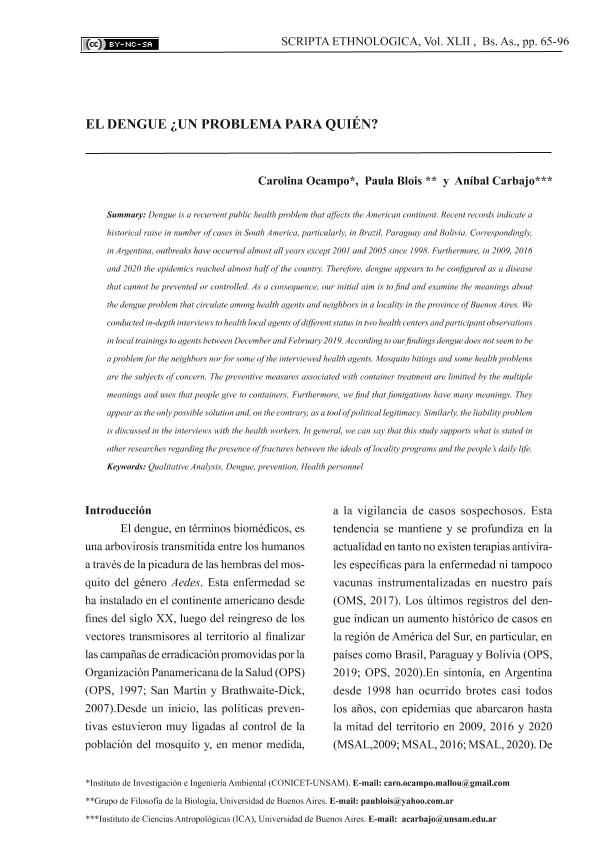Mostrar el registro sencillo del ítem
dc.contributor.author
Ocampo Mallou, Carolina

dc.contributor.author
Blois, Paula
dc.contributor.author
Carbajo, Anibal Eduardo

dc.date.available
2021-10-06T16:17:03Z
dc.date.issued
2020-11
dc.identifier.citation
Ocampo Mallou, Carolina; Blois, Paula; Carbajo, Anibal Eduardo; El dengue, ¿un problema para quién?; Centro Argentino de Etnología Americana; Scripta Ethnologica; 42; 11-2020; 65-96
dc.identifier.issn
0325-6669
dc.identifier.uri
http://hdl.handle.net/11336/142890
dc.description.abstract
Dengue is a recurrent public health problem that affects the American continent. Recent records indicate a historical raise in number of cases in South America, particularly, in Brazil, Paraguay and Bolivia. Correspondingly, in Argentina, outbreaks have occurred almost all years except 2001 and 2005 since 1998. Furthermore, in 2009, 2016 and 2020 the epidemics reached almost half of the country. Therefore, dengue appears to be configured as a disease that cannot be prevented or controlled. As a consequence, our initial aim is to find and examine the meanings about the dengue problem that circulate among health agents and neighbors in a locality in the province of Buenos Aires. We conducted in-depth interviews to health local agents of different status in two health centers and participant observations in local trainings to agents between December and February 2019. According to our findings dengue does not seem to be a problem for the neighbors nor for some of the interviewed health agents. Mosquito bitings and some health problems are the subjects of concern. The preventive measures associated with container treatment are limitted by the multiple meanings and uses that people give to containers. Furthermore, we find that fumigations have many meanings. They appear as the only possible solution and, on the contrary, as a tool of political legitimacy. Similarly, the liability problem is discussed in the interviews with the health workers. In general, we can say that this study supports what is stated in other researches regarding the presence of fractures between the ideals of locality programs and the people’s daily life.
dc.format
application/pdf
dc.language.iso
spa
dc.publisher
Centro Argentino de Etnología Americana
dc.rights
info:eu-repo/semantics/openAccess
dc.rights.uri
https://creativecommons.org/licenses/by-nc-sa/2.5/ar/
dc.subject
Qualitative Analysis
dc.subject
Dengue
dc.subject
prevention
dc.subject
Health personnel
dc.subject.classification
Filosofía, Historia y Filosofía de la Ciencia y la Tecnología

dc.subject.classification
Filosofía, Ética y Religión

dc.subject.classification
HUMANIDADES

dc.subject.classification
Epidemiología

dc.subject.classification
Ciencias de la Salud

dc.subject.classification
CIENCIAS MÉDICAS Y DE LA SALUD

dc.title
El dengue, ¿un problema para quién?
dc.type
info:eu-repo/semantics/article
dc.type
info:ar-repo/semantics/artículo
dc.type
info:eu-repo/semantics/publishedVersion
dc.date.updated
2021-09-07T15:16:45Z
dc.identifier.eissn
1669-0990
dc.journal.volume
42
dc.journal.pagination
65-96
dc.journal.pais
Argentina

dc.journal.ciudad
Buenos Aires
dc.description.fil
Fil: Ocampo Mallou, Carolina. Universidad Nacional de San Martín. Instituto de Investigación e Ingeniería Ambiental. - Consejo Nacional de Investigaciones Científicas y Técnicas. Oficina de Coordinación Administrativa Parque Centenario. Instituto de Investigación e Ingeniería Ambiental; Argentina
dc.description.fil
Fil: Blois, Paula. Universidad de Buenos Aires; Argentina
dc.description.fil
Fil: Carbajo, Anibal Eduardo. Universidad Nacional de San Martín. Instituto de Investigación e Ingeniería Ambiental. - Consejo Nacional de Investigaciones Científicas y Técnicas. Oficina de Coordinación Administrativa Parque Centenario. Instituto de Investigación e Ingeniería Ambiental; Argentina. Universidad de Buenos Aires. Facultad de Filosofía y Letras. Instituto de Ciencias Antropológicas; Argentina
dc.journal.title
Scripta Ethnologica
dc.relation.alternativeid
info:eu-repo/semantics/altIdentifier/url/https://www.redalyc.org/journal/148/14864828004/14864828004.pdf
Archivos asociados
